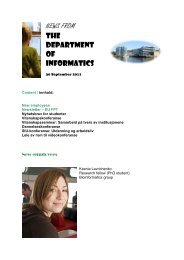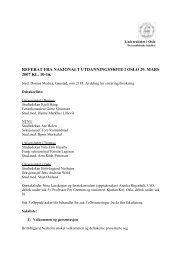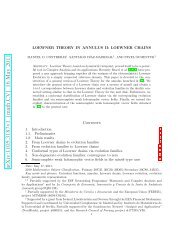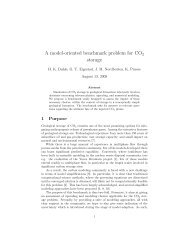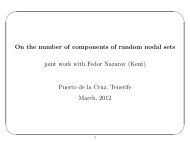?Caucasian? female labor migration in contemporary Russia ...
?Caucasian? female labor migration in contemporary Russia ...
?Caucasian? female labor migration in contemporary Russia ...
Create successful ePaper yourself
Turn your PDF publications into a flip-book with our unique Google optimized e-Paper software.
processes; western way of life with its <strong>in</strong>dividualism values was adopted <strong>in</strong> post-socialist<br />
<strong>Russia</strong>. This leaded to the weaken<strong>in</strong>g of the family ties and former patterns of family<br />
relations. As a result, elder family members, like grannies and other <strong>female</strong> relatives, are<br />
not ready to take responsibility for child care of their younger relatives any more; or at least<br />
not <strong>in</strong> the same scope. It happens partly because the elders are employed (sometimes<br />
<strong>in</strong>formally, when already retired), partly because they do not feel the child care to be a<br />
value and their responsibility (this is especially characteristic for big cities). Therefore<br />
young parents, who can not rely on family care any more, are forced to resort to the help of<br />
waged domestic work and private child care workers.<br />
So there is a grow<strong>in</strong>g demand for waged domestic work and childcare <strong>in</strong> <strong>contemporary</strong> big<br />
<strong>Russia</strong>n cities. However <strong>in</strong> reality, <strong>female</strong> migrant are not represented <strong>in</strong> the sector of domestic<br />
and child care work, <strong>in</strong> spite of such a demand and <strong>in</strong> spite of the fact that this is one of the most<br />
popular economic niche for <strong>female</strong> migrants all over the world. In <strong>Russia</strong> this niche is ma<strong>in</strong>ly<br />
occupied by either young women hav<strong>in</strong>g special education who are usually hired via agencies, or<br />
by local women of middle age and elder who are found through social networks. Prelim<strong>in</strong>ary<br />
observations and analysis allow to identify several reasons, expla<strong>in</strong><strong>in</strong>g why immigrant <strong>female</strong>s<br />
are not dom<strong>in</strong>at<strong>in</strong>g <strong>in</strong> this sector and loose the competition with locals. I would like to note that,<br />
of course, all the factors listed below are <strong>in</strong>terconnected even though have different “nature” or<br />
concern different dimensions of social life <strong>in</strong> the society:<br />
1) Social reason: illegal migrants are excluded from either official <strong>labor</strong> market (agencies)<br />
and from social networks of the locals, while all the domestic workers are searched through<br />
personal networks or at official agencies – due to security issue (domestic worker is someone<br />
you allow to enter your home, your privacy; therefore you need to trust him or her; and<br />
trustworthy is checked through personal networks or is guaranteed by the reputation of the<br />
agency. This is especially important <strong>in</strong> case of child care).<br />
2) Economic reason: there is a social stratum <strong>in</strong> the society which members are <strong>in</strong> very bad<br />
economic condition even though they are not migrants: old women (also men, but men are<br />
almost never considered as domestic workers <strong>in</strong> <strong>Russia</strong>). They live for very small pensions or are<br />
unemployed because loose competition with younger colleagues, or they are partly employed for<br />
very low paid jobs (low qualification, state sector or part time). They are disadvantaged people; a<br />
sort of “migrants / refugees <strong>in</strong> their own countries”, they are excluded from prosper<strong>in</strong>g sectors of<br />
social and economic life, that can guarantee m<strong>in</strong>imal social secure. Therefore they are ready to<br />
work as domestic workers for small wages. This read<strong>in</strong>ess is completed by several cultural<br />
values, attitudes and stereotypes.<br />
3) Cultural reasons: here gender and age characteristics are of ma<strong>in</strong> importance.<br />
a. There are cultural patterns exist<strong>in</strong>g <strong>in</strong> <strong>Russia</strong>, as well as <strong>in</strong> many European countries, <strong>in</strong><br />
accord<strong>in</strong>g to which, care (especially child care) is seen as women's doma<strong>in</strong>. So preferably it is<br />
considered to be done by <strong>female</strong> relatives, mother or grannies; but <strong>in</strong> case it is impossible – by<br />
<strong>female</strong> employees. But, <strong>in</strong> fact, s<strong>in</strong>ce family ties are kept strong <strong>in</strong> <strong>Russia</strong> still, grandmothers are<br />
often <strong>in</strong>volved <strong>in</strong> domestic work and child care – for free. In this sense scholars claim that the<br />
upward social mobility of middle class young women is a built on the downward mobility of<br />
women of the elder soviet generation (Zdravomyslova 2006). Anyway this is not a pure<br />
<strong>in</strong>strumental exploitation, but a cultural pattern that elder women reproduce; they feel themselves<br />
responsible for child care, especially for grandchildren, and feel <strong>in</strong>sulted when parents hire<br />
nannies or baby-sitters <strong>in</strong>stead of us<strong>in</strong>g grandmother free <strong>labor</strong>.<br />
b. Another cultural stereotype proceed<strong>in</strong>g from the same roots is the one that domestic work<br />
and child care are to be carried out for free as “a <strong>labor</strong> of love”, so <strong>in</strong> practice this stereotype<br />
5









